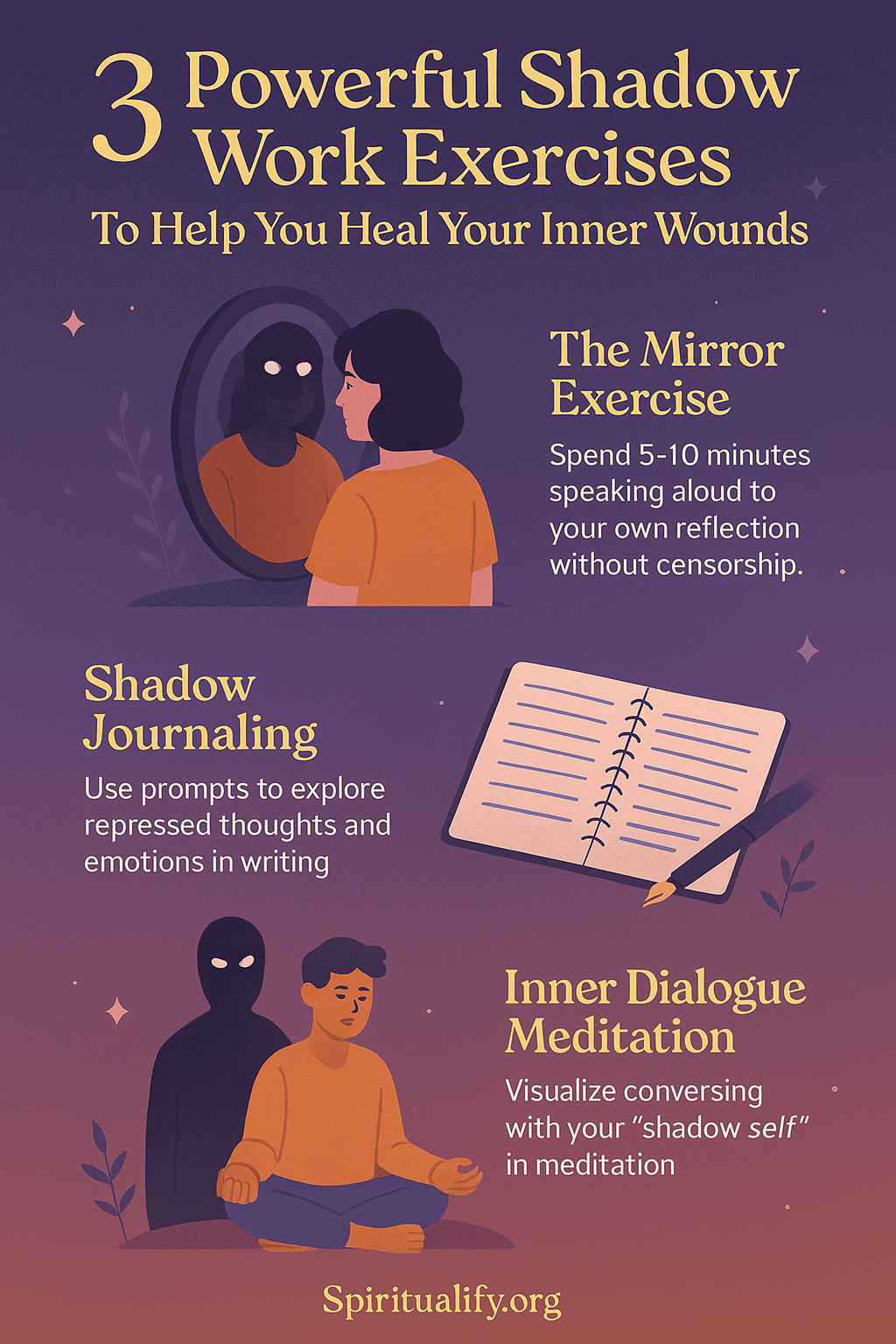3 Powerful Shadow Work Exercises To Help You Heal Your Inner Wounds
We all have our demons, our shadows, our skeletons in the closet. You can't just outrun your shadow. It follows you wherever you go.
When the Sun is shining even more brightly, the shadow will become even more obvious. Even though none of us like to acknowledge it, we all have a shadow side.
This can manifest as problems with mental health, illness, feelings of low self-worth, addictions, and other mental and physical health issues that can affect an individual's overall quality of life.
Shadow work may sound intimidating, but it is essential work that must be done in order to find genuine joy and peace in one's life.
As a habitual response to particular locations, people, or things, our own shadow often harms our lives in ways that we are unaware of.
Our own shadows keep us from being our best version possible and realizing our full potential. Please note that if you are currently dealing with issues of low self-esteem, you should not do shadow work exercises.
You will probably feel a million times worse and hate yourself if you explore the demons that you have inside of you. Work on improving your relationship with yourself first; only after that should you consider engaging in shadow work.
Shadow work is something that should only be done by people who have a sound and secure sense of who they are, as well as a friendly relationship with themselves.
What is the Shadow?

The shadow is referred to as the “dark side” of our personality because it is mainly made up of primitive human emotions and impulses. These include feelings of resentment, envy, greed, egotism, desire, and the desire to seek power.
The shadow contains everything in ourselves that we reject as being inferior, evil, or unacceptable. It has everything that we deny exists within us.
This shadowy side contains everything that does not align with the conscious attitude that we have chosen to adopt.
The personal shadow is the denied self. It represents the aspects of ourselves, including the positive qualities that we possess, that we no longer claim as our own.
Those aspects of our personalities that we choose to ignore or deny will not simply disappear. Even though we do not acknowledge them in an effort to make them go away, we cannot eliminate them.
They are a part of our unconscious. The unconscious is everything about ourselves that we are not aware of. We are unable to do away with the shadow. He stays with us and acts as our secret sibling or brother.
When we don't see it, the situation actually becomes more difficult. Because then, in a sense, it is right behind us.
How the Shadow is Formed

Every kid is capable of showing love, generosity, and kindness; however, they are also capable of expressing anger, selfishness, and greed.
These feelings are an inherent component of our shared humanity. However, when we reach adulthood, a change takes place in us.
The characteristics that are associated with being good are accepted, whereas the characteristics that are associated with being bad are rejected.
We share a basic set of needs. These needs can be broken down into categories such as physiological needs, needs for safety, and belonging.
These needs are biological and instinctive. When we expressed certain parts of ourselves as children, we received negative signals from our environment.
Perhaps we lost our cool and had a temper tantrum. Our parents reprimanded the tantrum and sent us to our room. Maybe we acted naughty, playful, spontaneous, or silly behavior when we were in first grade.
When something like this occurred, and it might have occurred quite frequently, it posed a risk to one of our fundamental needs. We modified our actions in order to satisfy our needs, and we learned to adapt to the outside world.
This process of pushing unwanted aspects aside results in what is known as the personal shadow in the field of psychology.
What is Shadow Work?

As was mentioned earlier, your shadow is a part of your subconscious and contains everything that you are embarrassed to think and feel, as well as every impulse, suppressed idea, desire, and fear that you have knowingly or unconsciously “locked away” for whatever reason.
The goal of shadow work is to unearth everything that we have hidden about ourselves, as well as every aspect of ourselves that has been denied and rejected. Why?
Because if we don't come clean with ourselves about the things we've been keeping hidden, we'll continue to be plagued by problems like resentment, guilt, shame, disgust, and sadness.
Exploring your own “shadow” or “inner darkness” is what shadow work means.
In the course of human history, shadow work has played a significant role in determining what factors contribute to mental illness, physical ailments, and even insanity, which can lead to various types of criminal behavior.
Shadow work was traditionally considered to be the realm of shamans, medicine men, and priests/priestesses. Psychiatrists, psychologists, and other mental health professionals, as well as spirit guides and therapists, are increasingly involved in shadow work in modern times.
Ignore the Shadow at Your own Risk

The ancient Greeks were well aware of the significance of paying respect to every aspect of one's psyche. For them, these parts were deities and goddesses in their own right, and they worshipped them as such.
The ancient Greeks were well aware that if they disobeyed a god or goddess, that deity would eventually turn on them and cause their destruction.
Any aspect of ourselves that we try to suppress will eventually work against us. The personal shadow is a collection of these aspects that are hidden or suppressed.
The problem is that the shadow is capable of acting independently of us, even when we are fully aware of what it is doing. We do things that we would not do voluntarily and later regret.
We make statements that we normally wouldn't make. Our facial expressions are able to convey the feelings that we are unconsciously experiencing.
If we choose to ignore the shadow, it will have a negative impact on our personal relationships with our spouses, families, and friends. It will also have an impact on our professional relationships and leadership abilities.
What Happens When You Suppress Your Shadow?

What happens to all of the aspects of ourselves that we choose to lock away? Whatever aspects of ourselves we don't like or accept, we see in others.
This idea refers to projection in psychology. Everything that we have repressed deep within ourselves gets projected onto other people.
For instance, if you get upset when someone is rude to you, there is a good chance that you haven't recognized the rudeness that you have displayed toward others.
That does not exonerate the person from being impolite to you in any way. But if you didn't have rudeness in your shadow, the rude behavior of others wouldn't bother you nearly as much.
This process is not conscious. We are not conscious of the projections we are making. Our ego employs this mechanism in order to defend itself, or more specifically, to defend how it sees itself.
We are unable to connect with our shadow selves because we have constructed false identities in which we are “good.”
These psychological projections distort reality and create a wide gap between how we see ourselves and how we really behave.
5 Advantages of Shadow Work

Shadow is not a topic that people are interested in. Who takes pleasure in exposing their shortcomings, whether they be selfishness, spite, hatred, or anything else?
Putting our attention on the things that we are good at makes for a more enjoyable experience. Nevertheless, delving into our shadow selves gives us great opportunities for personal development.
Let's take a look at 5 advantages that come from doing shadow work:
1. Better relationships

When you confront your darker half while accepting your shadow, you gain a more accurate perception of who you are. You become more complete, grounded, and human.
When you are able to accept the shadow sides of yourself, it becomes much easier to accept the shadow sides of others.
Thus, you won't be as easily set off by the actions of other people. Additionally, you will have an easier time communicating with them.
Your marriage, your family, your friends, and even your professional connections will all become more satisfying to you as a result.
2. Better perception

When you see others and yourself as you are, you have a clearer lens through which to view the world. Accepting your shadow brings you closer to your true self, which enables you to have a more accurate assessment of who you are.
When you are self-aware, you are able to make a more accurate assessment of your surroundings. You will have a more clear perspective on others and be able to evaluate situations with more compassion and understanding.
3. More energy and better physical health

It's a lot of work to repress all of the aspects of ourselves that we don't want to deal with, and doing so can be exhausting.
Mental suppression can also lead to physical pain and illness. Through shadow work, you are able to free up a massive store of energy that you have subconsciously kept reserved for the purpose of protecting yourself.
Your physical, mental, and emotional health can all see improvements as a result. Shadow work can give you more inner strength and a greater sense of balance, which will make you better equipped to deal with the challenges that life throws at you.
4. Psychological development and maturity

It will be challenging for us to arrive at a place of wholeness and unity as long as we continue to ignore our shadows and repress certain aspects of our personalities.
How can we expect to feel a sense of wholeness and equilibrium if our minds are divided?
When you integrate the shadow, you move one step closer to experiencing a sense of wholeness in your life. It is an essential step on the path to becoming a fully developed adult.
5. More creativity

Shadow work has many advantages, but one of the most important ones is that it frees up more of your creative potential. People who have their mental health in check are more likely to be creative.

5 Tips When You Engage in Shadow Work
You will find it much simpler to devote yourself to your shadow if you follow these 5 steps:
1. Focus

Before beginning shadow work, this is probably the single most important thing you should take care of first. You won't find it mentioned very often.
If you try to understand your shadow when you are not focused on the Self, you will not arrive at any conclusions that are helpful. The shadow is a representation of various aspects of your psyche that are hidden.
They will be judgmental, critical, or confused. Your ability to incorporate your shadow will be hindered as a result of this. You need to be in a state of calm and concentration before beginning shadow work.
2. Cultivate self-compassion

It is helpful to develop a sense of unconditional kindness with yourself before getting to know your shadow. This will prepare you for the experience. This is referred to as Maitri in Buddhism.
It is difficult to look at the darker sides of ourselves if we do not have kindness and self-compassion. It is not easy to look our shadow in the eye when we are hard on ourselves when we make a mistake.
If you are used to feeling ashamed or guilty, you need to transform those feelings by practicing kindness toward yourself, accepting yourself, and having compassion for yourself.
Beginning to acknowledge your own humanity is the first step. Connecting with my heart is something that I've found to be very beneficial.
Direct your attention to where your heart is located. Take a deep breath in and bring your attention to your heart. Take a deep breath out and say “thank you” to your heart as you exhale.
3. Maintain self-confidence

To be able to see our shadow, we must have a self-reflective attitude, which is the ability to reflect on and observe our own actions, thoughts, and emotions.
Being aware of the present moment without engaging the inner critic or other forms of judgment is a skill that can be developed through mindfulness meditation.
Self-awareness and self-reflection are necessary steps that must be taken before engaging in shadow work because they enable us to observe and evaluate our feelings and emotional responses without resorting to judgment or criticism.
4. Be bold and honest

Shadow work requires a high level of honesty. Confronting the aspects of yourself that you have denied can be unsettling at times, which is why the ego spends a lot of energy trying to repress those aspects.
It can be difficult to see and accept the tyrannical and evil parts of ourselves, as well as our own insecurity and selfishness.
It takes bravery to take an honest look at our own emotions, thoughts, and behaviors, especially the more troubling ones.
The rewards are worth the discomfort because this honest confrontation with your shadow helps heal the divisions in your mind.
This bold act frees up more of your creative potential and introduces you to a whole new world of opportunities for your personal growth as a psychological being.
5. Write down your discoveries

It fascinates me how some of our repressed parts are hidden from view. Similar to how a dream slips from memory shortly after waking up, our repressed parts can escape us.
It may be helpful to keep a journal in which you record any new insights you gain about who you are.
Shadow work – Exercises
The following are 3 different ways to work with your shadow:
Exercise 1: Pay attention to your emotional reactions

Keep in mind that the shadow is difficult to catch; it hides behind us. Our defenses are constructed in a way that will prevent our shadow from being seen and will block it from view.
When you pay more attention to your actions and feelings, the greater the likelihood that you will be able to catch your shadow in the act.
Paying attention to the emotional responses you have toward others is one of the most effective ways to recognize your shadow self.
Some of your coworkers may be hostile, arrogant, inconsiderate, or impatient; however, if you don't have any of these characteristics in you, you won't have a strong reaction to the way they act.
You can teach yourself to recognize your shadow when you see others having strong negative emotional responses.
Everything about other people that gets on our nerves can teach us something about who we are as individuals. However, we rarely have time to work with these emotions on the ground.
It is beneficial to wrap up each day by giving yourself five to ten minutes to think about the people you interacted with and your associated reactions. Whatever it is about another person that bothers you, it's likely a facet of yourself that you've been denying.
Get to know that part, accept it, make it a part of you, and the next time you see it in someone else, it may not cause a strong emotional charge.
Pay attention to the things and people that are causing you to feel uncomfortable emotionally. It makes no difference what the emotion is; it is an indication that you are denying something within yourself.
Exercise 2: Have an inner dialogue

Many different kinds of inner work require you to have an ongoing conversation with the darker aspects of your personality.
At first glance, this may seem like a scary idea, as we believe that only “crazy people” talk to themselves.
However, each of us is composed of a multitude of subpersonalities, as well as countless unrecognized, autonomous parts in our minds. Many psychologists present a variety of approaches to working with these various parts.
If we don't pay attention to these parts, one or many of which represent aspects of our shadow, they have the opportunity to influence our behavior.
Have you ever said or done something, and afterward questioned why you said or did it? A part of you has taken command. Any so-called “accident” is actually a part of your behavior that was taken over by another.
Our ignored or denied parts do not intentionally seek to cause us harm; however, when we ignore or deny them, they often do.
By entering into dialogue with them in our imagination or in a diary, we can integrate these parts into our conscious selves. When that happens, they will stop being our enemies and start being our friends.
Exercise 3: Challenge your good part

Many of us consider ourselves to be “good people.” As children, we were praised for being “good boys” or “good girls,” and this stuck with us into adulthood.
This further emphasized the gap that existed between our conscious identity and our subconscious self.
Create a list detailing all of the good things about you. Then highlight the opposite. Try to identify the opposite in yourself.
For instance, if you define yourself as a person who is disciplined, you repress the part of yourself that is lazy. This part stays in the shadows.
The part of you that is repressed has an effect on your behavior and constantly challenges the part of you that is disciplined.
Therefore, empathize with this laziness. Accept it. Become friends with it. You can be lazy at times.

Tags: HealingSpiritual Growth
Helen is the founder of Spiritualify.org where she covers all things astrology — from horoscopes and zodiac guides to retrograde alerts and moon updates. She also writes about other mystical lifestyle topics, such as numerology, crystal healing, tarot, dream interpretation, and more.







